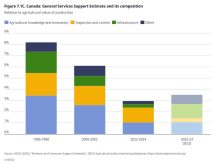The federal government says it will cover the costs of closing down the wheat board, but board chair Allen Oberg worries farmers will bear some of the costs.
And that s not all. Since government will own the new voluntary board the old board s assets, such as its 3,400 hoppers paid for by farmers to benefit farmers, will go to the government too, he said.
To me that doesn t sound fair but that s what s going to happen, Oberg said in an interview Nov. 3.
Read Also

Canada’s import ban on Avix bird control system ruffles feathers
Canadian producers’ access to Bird Control Group’s Avix laser system remains blocked despite efficacy studies and certifications, as avian flu deaths rise.
Nor is it fair that farmers will pay for two lake freighters they will not own through the wheat board if the single desk is removed by Ottawa.
Earlier this year the board paid $11 million towards the purchase of those grain boats.
It s my desire to have that pool reimbursed so that farmers aren t paying for an asset that they will get absolutely no benefit from whatsoever, he said.
As long as the organization was ongoing, it made perfect sense to deduct it from farmers to pay for that asset, but with this new legislation, (C-18) that makes no sense at all.
The board announced in February it had contracted the construction of two boats at a cost of $65 million. Payments were to come from its pool accounts over four years costing farmers an estimated $1 a tonne. The investment was to earn the board and ultimately farmers $10 million a year.
Speaking at a Grain Growers of Canada meeting in Leduc, Alta., Nov. 1 Agriculture Minister Gerry Ritz said the government is stuck with the contract.
The penalties far outweigh doing anything about that at this point so will continue moving forward on that and then sell them whenever we make that decision, Ritz said.
Ritz also said: … the wind-down costs the extraordinary costs will be covered by the federal government.
It won t cost the government nearly as much to close the wheat board as the board estimates, he added. He claimed the board exaggerated the costs hoping to scare the government off its marketing freedom policy.
Having said that, we will use the existing contingency fund in order to mitigate the severance packages, Ritz said.
However, a government official contacted for clarification said later that won t happen. The contingency fund, is farmer money, and will stay with the board.
The board hasn t released its estimate of wind-down costs, only saying it will be hundreds of millions. But Oberg stands by the estimate, which he says was vetted by KPMG.
My concern here is that the minister is going to try and pass wind-down costs on to the backs of farmers, Oberg said. In fact, we moved a resolution at the last board meeting, which passed unanimously, that that should not happen.
Ritz says a new post-monopoly entity can bring value to farmers.
You know when I talk to representatives of the wheat board around the world they all tell me they can sell way more product than they ve been allowed to and at better prices, he said in Leduc. But the board has its goofy marketing concept… where they only put for sale a 12th of whatever commodity they have.
Say they have 20 million bushels of (whatever grain) they ll only put up a 12th of it every month. That way they never hit the bottom. But they also never hit the top. It s called mediocrity and that doesn t serve anybody.
The board sells crop all year either through cash or futures, Oberg said. The board sets a pricing pace, but gives management the discret ion to sell more or less than what was planned based on the markets.
If they see the market is high and suspect if might fall, their strategy will be to be oversold and of course the reverse if they think the market might be climbing, Oberg said.
The grain business is all about aversion of risk and the ones who are good at that are successful, so the minister doesn t know what he s talking about.
———
The grain business is all about aversion of risk and the ones who are good at that are successful, so the minister doesn t know what he s talking about.
Allen Oberg
Chair Canadian Wheat Board















